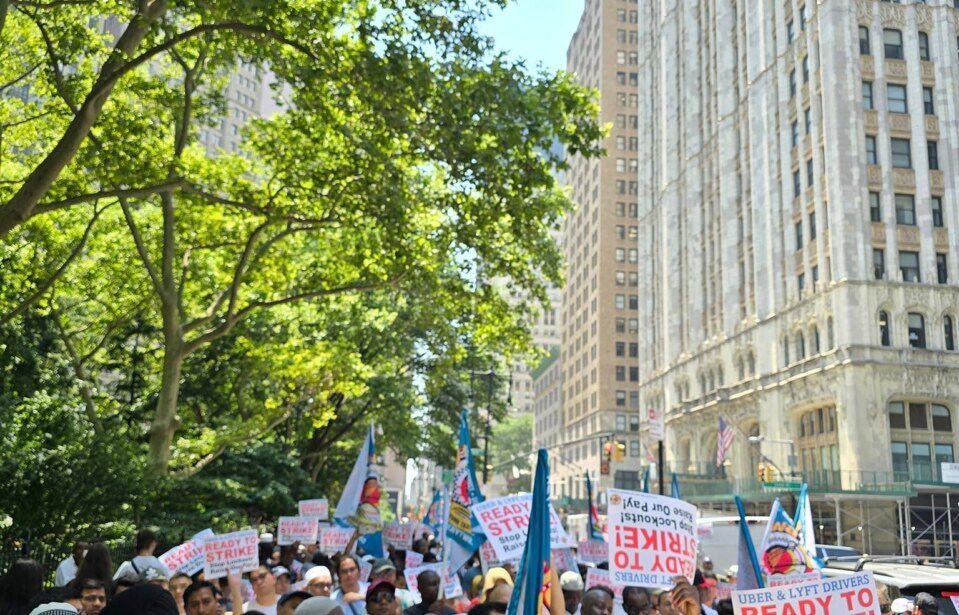In a powerful display of unity, Uber and Lyft drivers took to the streets of New York City to voice their discontent with the companies’ unfair “lockout” policies. More than a thousand drivers participated in the protest, demanding an end to practices that negatively impact their livelihoods. The demonstration shed light on the ongoing struggle between gig workers and ride-sharing giants, highlighting the need for fair and transparent policies.

The Issue of Lockout Policies
Uber and Lyft’s controversial “lockout” policies have sparked outrage among drivers. These policies allow the companies to lock drivers out of their apps during periods of low demand, preventing them from accepting rides. While the companies justify this as a way to manage supply and demand, drivers argue that it results in lost wages and unpredictable work schedules.
One driver, who wished to remain anonymous, shared their frustration: “These lockout policies are unfair and exploitative. We’re losing money during those locked-out periods, and it’s impossible to plan our work schedules. It’s like they have control over our entire lives.”
Impact on Drivers’ Livelihoods
The financial implications of lockout policies are significant. Drivers not only lose income during the lockout periods but also incur additional costs. With soaring gas prices and maintenance expenses, every minute of idle time takes a toll on their earnings. Many drivers feel trapped, unable to make ends meet despite working long hours.
“I’m out here driving, but I’m not actually making a living,” said a frustrated participant in the protest. “The lockout periods mean I’m wasting time and money, and it’s becoming harder to support my family.”
Deprivation of Reliable Work Schedule
In addition to financial losses, lockout policies disrupt drivers’ work schedules, making it challenging to plan their days. The unpredictable nature of the lockouts adds stress and uncertainty to their lives. Drivers are unable to rely on a consistent income, affecting their ability to manage expenses and plan for the future.
“I can’t even plan my day anymore,” expressed a disheartened driver. “I might log in, hoping for a few rides, but then I get locked out. It’s like they’re controlling my entire schedule, and I have no say in it.”
The Need for Collective Action
The protest in NYC streets reflects a growing sentiment among ride-share drivers across the country. By banding together, drivers are sending a clear message to Uber and Lyft: enough is enough. They are demanding an end to lockout policies and calling for more transparent and worker-friendly practices.
A spokesperson for the New York Taxi Workers Alliance (NYTWA), a labor group supporting the drivers, stated: “Uber and Lyft have created a race to the bottom. We won’t stand for it. We’re calling for an end to these exploitative practices and the implementation of fair and just policies that respect the rights and livelihoods of our drivers.”
Impact on the Ride-Sharing Industry
The protest has brought attention to the often-overlooked challenges faced by gig workers in the ride-sharing industry. As consumers become more aware of the issues, they are demanding better treatment of drivers. The protest has also prompted discussions among policymakers and regulators, highlighting the need for stronger protections and labor rights for gig workers.
A Call for Fair and Equitable Practices
Drivers are advocating for a more equitable distribution of power and a say in the policies that affect their work. They propose solutions such as providing advance notice of lockout periods, guaranteeing shifts, and involving drivers in the decision-making process. By engaging in collective action, they hope to negotiate better terms and working conditions.
Conclusion: Towards a Brighter Future for Ride-Share Drivers
The protest by Uber and Lyft drivers in NYC streets is a powerful statement of unity and a call for change. By standing together, drivers are demanding fair and transparent practices that respect their rights and livelihoods. It is a reminder that behind the convenience of ride-sharing apps are hardworking individuals who deserve dignified working conditions. As the movement gains momentum, it brings hope for a brighter future where gig workers are valued and treated with the respect they deserve.





Leave a comment